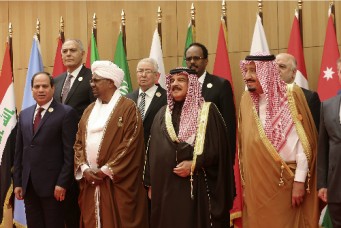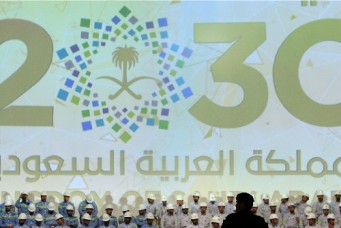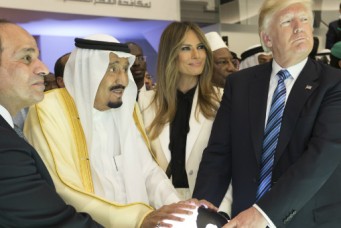Winds of Change in Riyadh
Saudi Arabia’s crown prince pushes for big changes at home and abroad, while consolidating his grip on power.

Saudi Crown Prince Mohammed Bin Salman at the Future Investment Initiative conference in Riyadh, Oct. 24, 2017. Hamad Mohammed/Reuters
There have recently been a number of unprecedented changes in the Saudi Arabian and regional political landscape. Saad Al-Hariri quit as Lebanon’s Prime Minister while blaming Iran during a visit to Riyadh on November 4. A day later, a sweep of mass arrests of the political and business elite took place, followed by a Houthi missile attack on the capital’s airport on November 6. The breathtaking pace of recent events illustrates the range of threats to the Al-Saud monarchy and state, both internal and external, and the extent to which Crown Prince Mohammed Bin Salman Bin Abdelaziz Al-Saud is taking the fight to the elites who have not yet bought into his ambitious plans. He is also ratcheting up pressure on Hezbollah and Iran, accusing them of direct aggression over the missile attack.
Prince Mohammed, acting under new anti-corruption powers, has detained 500 powerful Saudi figures, including eleven princes, four ministers, and dozens of ex-ministers, as well as the billionaire businessman, Prince Alwaleed Bin Talal. Sheikh Saud Al-Mojeb, the attorney general, said that the detentions were “merely the start of a vital process to root out corruption.” This might have been convincing had the move not been accompanied by a government reshuffle aimed at removing potential political threats. It included the removal of Prince Miteb, son of King Abdullah, who was head of the Saudi Arabian National Guard, and Abdullah Al-Sultan, the commoner appointed by King Abdullah as head of the Saudi navy. It also follows the brief detention and dismissal in July 2017 of Muhammad Bin Nayef, then crown prince and minister of interior. Bin Nayef had the confidence of the United States—built up through extensive U.S.-Saudi cooperation against Al-Qaeda in the Arabian Peninsula from 2003, and who himself suffered an Al-Qaeda assassination attempt in 2009. However, he also endorsed the position of hardline clerics against reform set forth by Mohammed Bin Salman, the son of the present king.
The crown prince has moved quickly to confirm his liberal progressive credentials by launching Saudi Vision 2030, which among other things, seeks to reduce dependence on oil and diversify the economy. Along these lines, he sought to float 5 percent of the Saudi Aramco shares (dubbed the biggest IPO in history), allowed women to drive, tolerated the reopening of cinemas, has plans for a tourism industry, and reigned in the powers of the religious police.
These actions are aimed not just at socio-economic reform, but at the consolidation of political power and securing $800 billion in assets which will help facilitate the economic diversification effort. It comes on the back of an embargo against Qatar over its support of Islamist groups, a proxy battle with Iran in states such as Lebanon and Syria, and military intervention in Yemen. Fighting so many domestic and foreign battles is an inherently risky strategy, and has significant potential for blowback against Mohammed Bin Salman, a young and relatively untested leader from a marginalized ulama, and from fallout in an increasingly volatile neighborhood, including the rise of Al-Qaeda and ISIS on its southern border. It is likely to add to the list of insurgencies Saudi Arabia has fought in its recent history, from the Grand Mosque seizure in 1979 to multiple Al-Qaeda attacks in the Kingdom after a post-9/11 clampdown on radical imams.
Only time will tell whether this brazen strategy will include further and direct confrontation with Iran, but judging by the escalation in tensions following the execution of Shia cleric Nimr Al-Nimr in 2016, the subsequent storming of the Saudi embassy in Tehran, and the cessation of diplomatic relations between both states, further incendiary steps cannot be discounted. Indeed, even though in announcing his resignation, Saad Al-Hariri made a televised speech in which he stated that there was a plot to kill him and blamed Hezbollah and Iran for this, he did it from Riyadh, where he remains, surprising his aides and prompting questions about his freedom of movement. If the aim was to provoke a military campaign to root Hezbollah from Lebanon (Saudi Arabia suspended $4 billion in military aid in 2016), the move comes about a decade too late. Having recovered from the 2006 Israeli incursion into southern Lebanon and battle-hardened by the Syria conflict, Hezbollah is now considered a middle ranking military power in the Middle East, and Iran is replicating its model in Iraq, Syria, and West Africa.
Mohammed bin Salman will continue to ensure that the centerpiece of his government, Saudi Vision 2030, is implemented to maximum effect, which has already been revised once. Now that the Islamists have been silenced, non-conformist elite stripped of their political clout and possibly billions in income, the consequences of not living up the aspirations of his main support base—Saudi youth who represent 70 percent of the population— could be dire. Mohammed Bin Salman represents a new type of leader, one which the UAE says is the best that the United States can hope for in terms of bringing about reforms, and is compared to his older counterpart, Mohammed Bin Zayed of the UAE. Maintaining the confidence of the Trump administration will be essential if Riyadh is to succeed in piling on pressure against Tehran and in being able to continue with its sectarian agenda.
Robert Mason is director of the Middle East Studies Center at AUC.




